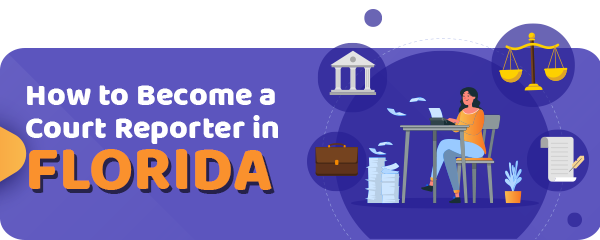A court reporter is also called a court stenographer, a real-time writer, or a certified shorthand reporter (CSR).
They write every word said during a trial or other legal procedures.
This makes a court reporter a significant part of the justice system.
Those interested in becoming a court reporter need a license and here, I will present the necessary route for licensure, so read on!
Article Table of Contents
Complete Your Education as a Court Reporter in Florida
Attaining licensure necessitates the successful completion of an accredited training program.
Moreover, the program must receive approval from the Florida Board of Court Reporting.
To enroll in such a program, two prerequisites must be met:
- Being at least 18 years of age
- Possession of a high school diploma or equivalent GED
The training programs cover a range of specializations, including:
- CART/Captioning
- Judicial Reporting
- Scoping/Proofreading
- Professional Transcription
- Office Assistant
- Court and Realtime Reporting
Future students must ensure the curriculum was approved by CASE (Council on Approved Student Education).
It should include subjects such as:
- Applied Writing I
- Medical Terminology
- Legal Terminology
- Civil and Criminal Law Terminology
- Realtime Reporting I
- Realtime Reporting II
Prospective students must ensure that the curriculum is endorsed by CASE (Council on Approved Student Education).
The program typically falls under the postsecondary non-degree category.
Various options, such as certificate and diploma programs, as well as associate’s and bachelor’s degrees, are available and accepted.
Numerous technical institutions and community colleges are present in Florida, presenting a diverse array of certificate and associate’s degree programs related to court reporting.
Your chosen route, whether a certificate program of shorter duration or a longer associate’s degree track, will determine your educational journey, which can span from 28 months to three years.
Consider the following institutions for your training.
Atlantic Technical College 
If you are looking for a court reporting program, the one offered by this college will give you everything you need.
The program is flexible, so you can learn at your own pace.
Plus, this is an accredited school so you can easily get your certification after completing it.
| School Name | Address |
|---|---|
| Atlantic Technical College | 4700 Coconut Creek Pkwy, Coconut Creek, FL 33063 |
Become Licensed as a Court Reporter in Florida
Upon successful completion of your education, passing an examination is a crucial requirement to obtain your license.
You have an 18-month window following the completion of your training to fulfill this requirement.
During this period, the option to obtain a temporary license is available, though this option cannot be renewed.
You can achieve either of the following certifications:
- NCRA’s Registered Professional Reporter (RPR) certification
- NVRA’s (National Verbatim Reporters Association) Certified Verbatim Reporter (CVR) certification
Both of these certifications hold national recognition.
To get your official license in Florida, you are also required to pass a skills examination, which can be administered by The Florida Court Reporters Association.
This entails the following steps:
- Pay some fees:
- $200 for the license
- $50 for the application
- Presentation of evidence confirming graduation from the training program
- Completion of the application form
Completing your court reporter certification program entails participation in the one-day Florida Rules and Ethics Certification Seminar.
After it is finished, you will be given the chance to undertake the certification examination.
A performance level of 80 percent or higher is regarded as a passing grade.
This will allow you to get your certification.
Keep in mind that the submission of evidence confirming your graduation from a court-reporting school is needed for obtaining the certification.
For exam registration and access to forthcoming examination dates and venues, the FCRA website serves as a resource.
You will also have to pass the following written subjects:
- Communications/language and writing
- Word processing
- Medical terminology
- Foundations of law
- Court reporting transcript preparation
- Court reporting procedures
- Vocabulary and usage
- Captioning
A minimum passing score of 80 is required, accompanied by the following fee structure:
- $220 for non-members
- $195 for members
- $160 for student members
Court Reporter License Renewal in Florida
As with most licenses, the court reporter license also requires periodic renewal.
In Florida, the Board mandates license renewal every 3 years.
For that to happen, you also need to get 3 continuing education credits.
This must be accomplished by December 31st.
A reminder email will be sent out months before so that you don’t miss the deadline.
If you have any extra credits, they can be rolled over to the next period.
Keep in mind that the continuing education hours must be achieved through an accredited organization.
One reliable organization is The Florida Court Reporters Association.
Court Reporter Salary in Florida
You may be wondering about the salary for court reporters in Florida after you get your license.
You should know that depends on various factors, such as where you live and your employment place, but the median value is of $58,730 per year.
However, you can expect higher salaries in urban areas.
Check out the table below for more info on what court reporters earn in this state, especially the cities where the values are higher.
Annual Salary Range:| Location | Avg. Annual Salary |
|---|---|
| Fort Lauderdale | $60,034 |
| Hollywood | $60,034 |
| Miami | $59,998 |
| Hialeah | $59,719 |
| Pembroke Pines | $59,645 |
| Tampa | $58,841 |
| Jacksonville | $58,779 |
| Orlando | $58,724 |
| Clarkona | $58,724 |
| Ferndale | $58,477 |
Regional Salary in Florida
| Region | Employed | Avg. Annual Salary | Avg. Hourly Pay | Top 10% Annual Salary | Bottom 10% Annual Salary |
|---|---|---|---|---|---|
| Jacksonville, FL | 60 | $49,970 | $24.02 | $86,300 | $28,010 |
| Miami-Fort Lauderdale-West Palm Beach, FL | 330 | $56,530 | $27.18 | $89,510 | $29,050 |
| North Port-Sarasota-Bradenton, FL | 40 | $53,650 | $25.79 | $87,810 | $28,510 |
| Orlando-Kissimmee-Sanford, FL | 200 | $49,660 | $23.88 | $70,940 | $35,340 |
| Tampa-St. Petersburg-Clearwater, FL | 140 | $53,310 | $25.63 | $87,000 | $28,250 |
* Employment conditions in your area may vary.
Frequently Asked Questions
Where can i find work as a Court Reporter in Florida?
A court reporter will usually work for:
- Supreme Court of Florida
- Court of Civil Appeals
- Court of Criminal Appeals
- Administrative Offices of the Courts
If you consider yourself a real-time writer, you can work as a freelancer in many different settings.
What skills do I need to become a court reporter in Florida?
Here are some of the main skills and abilities of a court reporter:
- Good hearing
- Able to sit for long periods
- Word knowledge
- English / grammar skills
- Good use of both hands
- Able to handle stress
- Good organizational skills
What other requirements are there to become a court reporter in Florida?
Candidates for licensure must ensure they:
- Are an American citizen
- Have a photo not older than 6 months
Read the full guide: How to Become a Court Reporter (Stenographer)

